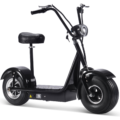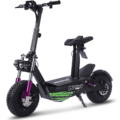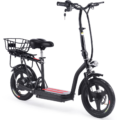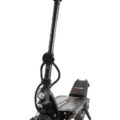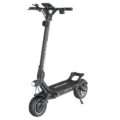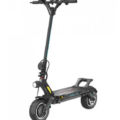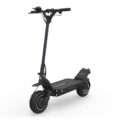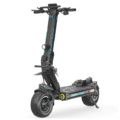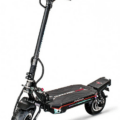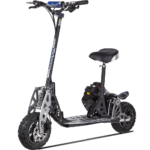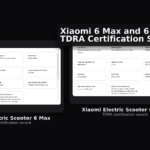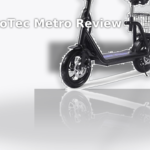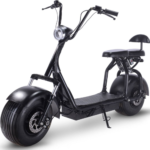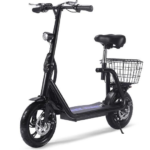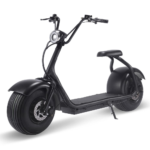- Home
- Scooters
- Electric Scooters
- MotoTec Thor
MotoTec Thor
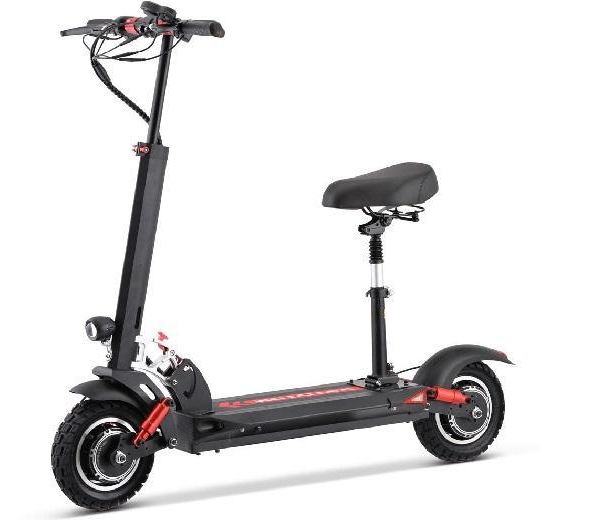

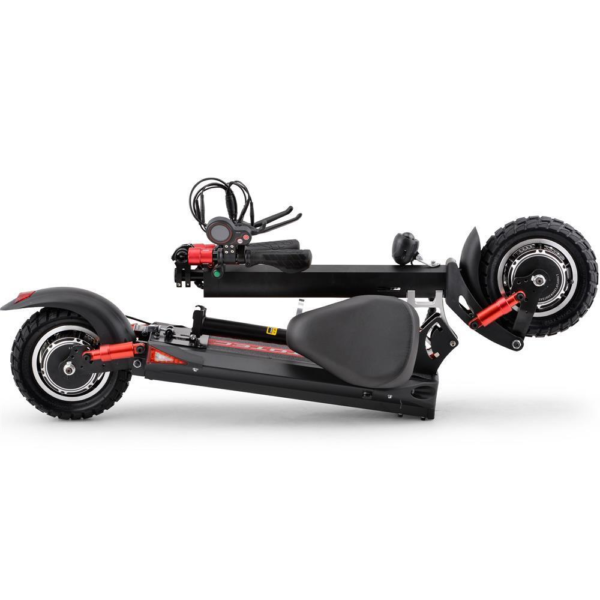
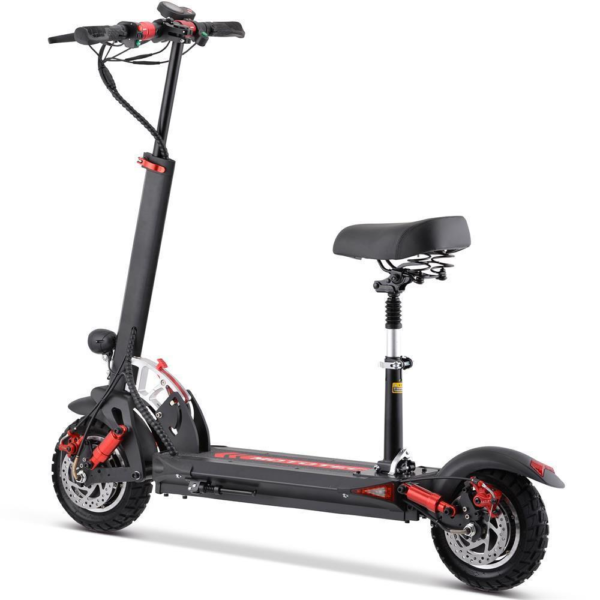
- Battery Range: 10–30 miles (16–48 km)
- Top Speed: 40 mph (64 km/h)
- Motor Power: 2×1200 W (2400 W)
- Weight Capacity: 310 lb (140.6 kg)
- Charging Time: ~4–8 h
- Scooter Weight: Not specified
PROS
- Dual 1200 W hub motors (2WD)
- High 40 mph (64 km/h) top speed
- Dual suspension front & rear
- Front and rear disc brakes
- LCD panel with cruise control & USB
- 310 lb (140.6 kg) rider capacity
CONS
- Very heavy (weight not specified)
- Range varies widely by mode and rider
- No official IP rating
- No mobile app
Key Takeaways
- The MotoTec Thor is a powerful electric scooter with dual motors, offering strong acceleration and a maximum speed of 40 mph.
- Its 60-volt system provides a range of 10-30 miles, depending on rider weight, speed, and terrain conditions.
- Key features include an LCD display, cruise control, disc brakes, adjustable handlebars, and a removable seat for added comfort.
- The durable design accommodates mixed surfaces, while its foldable frame aids portability for urban environments.
- Ideal for commuters and students, the MotoTec Thor excels in hilly areas, supporting weights up to 310 lb and suitable for riders ages 13 and up.
Table of contents
- What Is the MotoTec Thor?
- How the MotoTec Thor Works
- Key Specifications
- Design & Build Quality
- Performance Fundamentals
- Battery, Range & Efficiency
- Ride Quality & Comfort
- Braking & Safety Features
- Portability & Daily Usability
- Maintenance & Care
- Weather & Seasonal Considerations
- MotoTec Thor vs Alternatives
- Who the MotoTec Thor Is (and Isn’t) For
- FAQs
- Glossary
- Writing-Style Notes for Buyers
- Why the Thor Still Stands Out
- Final Checks Before You Buy
The MotoTec Thor is a big-body, dual-motor electric scooter with strong pull and steady cruise. It suits riders who want quick starts, firm brakes, and a roomy deck. It works for short commutes, weekend loops, and mixed surfaces. So, if you want power with simple controls, this one makes sense.
What Is the MotoTec Thor?
The MotoTec Thor runs a 60-volt system with two 1,200-watt hub motors. It uses a lithium battery and front and rear disc brakes. You get an LCD display, cruise control, adjustable bars, dual suspension, and a seat in the box. Top speed is listed at 40 mph (64 km/h). Range is listed at 10–30 miles (16–48 km), and that spread tracks with speed, rider weight, and terrain. The frame is alloy. The tires stand near 10 inches tall. The scooter folds for storage. Then, when you pick it up, remember it weighs 73 lb (33.1 kg).
How the MotoTec Thor Works
Think of it like a compact electric moped, only simpler. Two hub motors live in the wheels. Power flows from the 60 V pack to the controller, and the controller meters current to match your throttle. You pick a speed mode on the LCD and roll the trigger. So, starts feel strong but not jumpy, and top speed stays in the lane you chose.
Braking is straight and sturdy. Both wheels use mechanical discs. Lever feel depends on cable setup, pad wear, and rotor alignment. Lights cover the basics for night rides. The LCD shows speed and distance and supports cruise control for steady roads. Then, when space gets tight, fold the stem and carry it a short stretch. The seat mounts on a post when you want to sit, and it comes off clean when you don’t.
Key Specifications
| Category | Item | Value |
|---|---|---|
| General | Model | MotoTec Thor 60V 2400W Lithium Electric Scooter |
| Recommended Age | 13+ years | |
| Max Rider Weight | 310 lb (141 kg) | |
| Folding | Yes | |
| Seat | Included | |
| Performance & Power | Motors | Dual hub, 1,200 W ×2 (2,400 W total), 60 V |
| Top Speed | 40 mph (64 km/h) | |
| Speed Modes | 3 speed selection | |
| Battery, Charging & Electrical | Battery | 60 V / 18 Ah lithium-ion (≈1,080 Wh) |
| Charge Time | 4–8 hours | |
| Display & Controls | LCD with speedometer, odometer, cruise control, USB charging socket | |
| Build & Dimensions | Frame | Alloy |
| Tires | 80/6.5-6 (≈10 in overall height) | |
| Deck Size | 10 × 24 in (25.4 × 61 cm) | |
| Size (Unfolded) | 43 × 23 × 47 in (109 × 58 × 119 cm) | |
| Folded Dimensions | Not specified by manufacturer | |
| Scooter Weight | 73 lb (33.1 kg) | |
| Safety & Control | Brakes | Front and rear disc |
| Lights | Headlight (high-definition spotlight) | |
| IP Rating | Not specified | |
| Features & Extras | Cruise Control | Yes |
| Adjustable Handlebars | Yes | |
| Suspension | Dual front and dual rear shocks | |
| USB Charging Socket | Yes | |
| Warranty & Compliance | Warranty | 60 days parts replacement |
| Compliance | Not stated. Follow local rules |
Metric values in parentheses are simple conversions.
Design & Build Quality
The frame feels solid, and the deck is wide enough for real stance changes. It measures 10 inches by 24 inches, so you can stand offset or side-by-side and still move your feet. The adjustable handlebar helps riders of different heights find a relaxed reach. So, long rides feel easier on your back and wrists.
The stem latch feels familiar if you’ve used folding scooters before. Set it snug, and recheck bolts after your first week. The LCD sits close to your right thumb, so speed modes and cruise are quick to reach. The trigger throttle becomes natural after a few rides. Meanwhile, the included seat gives you an option for steady, longer runs.
Tires are about 10 inches tall, which helps roll over cracks and seams. Dual shocks at both ends smooth sharp bumps at city speeds. The headlight throws a focused beam that helps you see and be seen. Still, side visibility helps at night, so consider reflectors or a small wearable tail light.
Cables track cleanly along the stem and into the deck. Fenders cover most splash zones. So, cleanup is easy with a soft cloth and mild soap. Skip pressure jets near bearings and seams, since high-pressure water can sneak past seals that weren’t designed for it.
Performance Fundamentals
This scooter has punch. Dual motors give you a quick launch, and the lowest mode keeps starts calm on crowded streets. Mode two fits rolling roads and keeps pace with city traffic. In the highest mode, the Thor chases its top end. So, leave room, hold a steady stance, and keep your eyes far ahead.
Stability stays confident at cruise. The long, wide deck keeps you planted, and the 10-inch tires take the edge off rough patches. The weight helps it track straight, and the suspension keeps the chassis from pitching over ripples. Then, as speeds rise, your stance matters more. Keep your knees soft, split your feet, and relax your grip.
How does it handle 7–10% hills? Short, steep ramps are fine in low and mid modes, and longer grades hold better in the top mode on clean, dry pavement. Speed will fade on very long climbs, which is normal for this class. So, use a steady throttle in the middle mode if traction feels loose, and save the fastest mode for smooth surfaces.
Battery, Range & Efficiency
The pack is 60 V and 18 Ah, which adds up to about 1,080 Wh. The listed range is 10–30 miles (16–48 km). That band makes sense, since speed and wind change energy use a lot. So, plan rides with a small buffer at first, and learn how your loop behaves.
Here’s a simple rule of thumb. At 15–18 mph on flat paths, lighter riders sit near the upper half. At 20–25 mph with normal stops, most riders land in the middle. Close to top speed, range drops fast because air drag rises fast. Cold weather trims range too. So, expect fewer miles on winter mornings.
Charging takes about 4–8 hours with the stock unit. Treat the pack kindly and it will last. Unplug not long after the light turns green. Store it near half charge if the scooter sits for weeks. Keep it out of direct sun on hot days. Then, in winter, warm the pack indoors before you ride.
The display tracks speed, trip, and mode, so you can watch usage from charge to charge. Reset the trip after each full charge. Then compare distance on the same route and pace. If range drops hard, check tire pressure, brake rub, and wheel alignment before you blame the battery.
These specifications give the baseline, and your habits finish the story. Smooth throttle, early coasting, and steady speeds grow miles without extra time on the charger.
Ride Quality & Comfort
The deck size lets you move a bit, and that helps on longer rides. Adjustable bars keep your posture neutral, and dual shocks help with rough edges. So, the scooter feels planted over patchy pavement, and it calms down chatter at neighborhood speeds. When traffic thins, the seat takes weight off your legs and makes cruise sections easier.
Tire type matters. If your unit ships with air-filled tires, set pressure to a moderate value that matches your weight and roads. Check it weekly. If your unit ships with solid tires, pinch flats are less likely, but the ride feels firmer. So, bend your knees over broken surfaces and keep speeds sensible over joints and utility cuts. In the wet, avoid paint lines and metal covers, since they can feel slick.
Stem flex can show up on many folding scooters as speeds climb. Keep the latch snug, keep the hinge clean, and recheck hardware monthly. Then, when you adjust brakes or cables, test lever feel in a safe area before you head back into traffic.
Braking & Safety Features
Both wheels use mechanical disc brakes, so the feel is predictable and easy to tune. Set cable tension so pads engage after a short pull. Try not to drag a lever on long downhills, since heat can glaze pads. Brake in a straight line before corners, and then roll back on the throttle once you stand the scooter up.
Lights help, but layers help more. The headlight is bright up front. Add a wearable tail light for depth cues, and think about reflective ankle bands for motion. The spec sheet does not include a water-resistance code. So, ride with care in the rain, leave extra space, and keep lean angles small. Then, dry the scooter when you get home and test the brakes before the next ride.
Portability & Daily Usability
At 73 lb (33.1 kg), this is not a one-hand carry up flights of stairs. You can lift it for a short hop, but rolling it is the plan most days. The fold helps with trunks and hall closets. Measure your space against the unfolded size, and leave room for bars and cables. Folded size isn’t listed, so grab your own measurements once it’s built.
The seat helps on long, steady runs. Pull it off for quick errands and tight turns. Lock the frame when you park. Run a U-lock or a hardened chain through a solid point, and bring it indoors at night if you can. Then, set a quick routine. Wipe the deck, check the latch, and test lights at the start of each week.
Maintenance & Care
A simple plan keeps the Thor quiet and tight.
Before each ride
- Check tire condition and pressure if you run air-filled tires.
- Squeeze both brake levers and feel for a firm bite.
- Inspect the stem latch and deck bolts for play.
- Power on the lights and display.
Every 2 weeks
- Wipe the frame and fenders clean.
- Check pad wear and cable stretch.
- Listen for rotor rub and re-center a caliper if needed.
- Verify rear axle nuts are snug.
Every month
- Inspect the hinge hardware and re-tighten to spec.
- Check wheel true and fasteners at the deck and bar clamp.
- Review your range log and compare against past rides.
Every 3–6 months
- Replace worn pads.
- Swap stretched cables and housings.
- True or replace a bent rotor if scraping persists.
- Inspect tire tread and sidewalls for cuts.
For the battery, store at room-ish temperature and partial charge when idle. Charge on a dry, flat surface with the stock charger. Unplug after it finishes. Then, give the deck time to cool on hot days before you plug in. These small habits add up over a season.
Weather & Seasonal Considerations
Heat, cold, and rain change range and grip. In hot weather, park in shade. If the deck feels very warm, let it cool before a charge. In cold weather, charge indoors and start with the pack near room temperature. Range falls below 50°F (10°C), so plan shorter loops. Start in a lower mode on cold tires. Then, step up once grip feels steady.
Rain asks for patience. There’s no listed IP rating. So, slow down, brake earlier, and avoid standing water that can hide sharp edges. When you get home, dry the scooter, wipe the hinge and deck seam, and check lever feel. Then, add a light lube on exposed cables so corrosion doesn’t creep in.
MotoTec Thor vs Alternatives
The Thor lives between heavy commuters and big performance rigs. It hits harder than many single-motor 48 V scooters, and it weighs less than huge 72 V machines. So, it suits mixed roads, firm brakes, and quick starts without chasing extreme speed. If you climb stairs daily, a lighter scooter saves your back. If you want long range at fast cruise, larger packs fit better. If you value seated riding, the included seat is a nice perk. For a lighter, simpler MotoTec, check the MotoTec Metro. For a playful trail option, take a look at the MotoTec Free Ride.
Where does it shine?
- Suburban commutes with rolling terrain.
- Weekend loops with a few climbs.
- Riders who like a wide deck and adjustable bars.
- Steady routes where cruise control makes sense.
Where does it give ground?
- Multi-modal trips with lots of stairs and transfers.
- Very long rides at near-top speeds.
- Wet-weather daily use where water resistance is a must.
Who the MotoTec Thor Is (and Isn’t) For
Great for
- Commuters who want strong pull and simple controls.
- Students with safe storage riding 5–15 miles (8–24 km).
- Hilly routes that need dual-motor torque.
- Owners who like a seat for steady cruise days.
Think twice if
- You need a scooter under 40 lb (18 kg).
- You ride most days in heavy rain.
- Your home or office has long stair climbs.
- You must know folded size before you buy.
FAQs
1) What is a quick MotoTec Thor overview?
It’s a 60 V, 2,400 W, dual-motor scooter with front and rear disc brakes, three speed modes, cruise control, and an LCD. Top speed is listed at 40 mph (64 km/h). Weight is 73 lb (33.1 kg). Load limit is 310 lb (141 kg).
2) How far can it go on one charge?
The listed range is 10–30 miles (16–48 km). Actual range depends on speed, rider weight, hills, wind, and temperature. So, plan with a buffer.
3) Does it use regenerative braking?
No. It uses mechanical discs. So, keep pads and cables in shape for best feel.
4) What size are the tires?
They’re listed as 80/6.5-6, which works out to about 10 inches tall. So, cracks and small curbs feel gentler than on smaller wheels.
5) Is the seat included?
Yes. You can ride seated or remove it and keep the deck clear.
6) What is the warranty?
The listed warranty is 60 days for parts replacement. Keep your receipt and serial number handy.
7) What are the exact folded dimensions?
They’re not listed. So, measure your own unit after setup and note it for storage.
Glossary
- Ah (amp-hours): Charge capacity. Bigger numbers often mean longer range.
- Wh (watt-hours): Battery energy. Volts × amp-hours.
- Controller: The unit that meters current from the pack to the motors.
- Cruise Control: Holds a steady speed without throttle input.
- Dual Hub Motors: One motor in each wheel hub.
- Speed Modes: Preset limits for power and top speed.
- Disc Brake: Caliper clamps a steel rotor to slow the wheel.
- Rotor Rub: Light scraping when a rotor touches a pad.
- Stem Flex: Small movement at the hinge or bar at speed.
- Deck: The platform you stand on.
- IP Rating: Water and dust resistance code. Not listed here.
- Torque: Twist force that drives quick starts and climbs.
- Trigger Throttle: Index-finger lever that controls power.
- Suspension (Shocks): Springs and dampers that smooth bumps.
- Load Limit: The max rider weight the scooter can carry.
Writing-Style Notes for Buyers
Here’s a simple plan that fits the Thor’s size and power.
- Start in mode 1 in busy areas, and bump to mode 2 on open blocks.
- Save mode 3 for empty, clean pavement.
- Keep both hands on the grips.
- Brake early and in a straight line.
- Use cruise control on clear, steady routes.
- Log miles and charge cycles so you spot changes early.
- Store indoors and charge on a dry, flat surface.
Why the Thor Still Stands Out
This scooter blends punch, deck space, and easy controls. Many rivals use one motor and a smaller platform. The Thor adds a second motor, a bigger deck, and an adjustable cockpit. You trade some carry comfort and you lose a published water rating. So, if those trade-offs are fine, the ride delivers. The specifications back that up, and the feel on the road matches. Acceleration hits hard, cruise stays calm, and the brakes bite with confidence. Treat the battery well, check hardware often, and keep your tires in shape, and it will serve you for a long time.
Final Checks Before You Buy
- Weight: 73 lb (33.1 kg). Plan your lifts and storage.
- Range: 10–30 miles (16–48 km). Match mode and speed to your route.
- Top Speed: 40 mph (64 km/h). Use with care and proper gear.
- Brakes: Dual mechanical discs. Keep pads and cables fresh.
- Water: No listed IP code. Ride dry when you can.
- Fit: Adjustable bars and a wide deck help on longer runs.
- Extras: Cruise control, a seat, and a USB port add comfort and utility.
These points line up with the specifications and with what large commuters feel like on real streets. So, think about your route, storage, and weather. Then pick the setup that fits your day.
Specifications
General
| Model The Model specifies the exact version or name of the scooter. It helps identify its unique design, features, and specifications within the manufacturer’s product line. Knowing the model makes it easier to compare options, find compatible accessories, or look up support information. | Thor |
| Brand The Brand identifies the manufacturer or company that designs and produces the scooter. A trusted brand is a sign of quality, reliability, and good customer support. Well-known brands often have higher standards for safety, performance, and after-sales service, giving you more confidence in your purchase. | MotoTec |
| Release Date The Release Date indicates when the scooter model was officially launched on the market. This helps you know how current the design, technology, and features are. A newer release date often means updated components, improved performance, and the latest safety or smart features. | 18 November 2025 |
| Recommended Age Recommended Age indicates the minimum age range that the scooter is designed for, based on safety, size, and ease of use. Following the recommended age helps ensure that riders can handle the scooter’s speed, weight, and controls comfortably and safely. Always check local laws and use protective gear, especially for younger riders. | 13+ |
Performance & Power
| Motor Power (Wattage) What it means: The motor power, measured in watts (W), shows how strong the scooter’s electric motor is. Why it matters: Higher wattage usually means better acceleration, more torque, and improved performance on hills or rough terrain. For example, a 250W motor is good for flat city roads and light riders, while a 500W or 1000W motor provides more power for faster speeds or climbing steep inclines. | Dual hub motors, 2 × 1200 W (60 V) |
| Top Speed The Top Speed indicates the maximum speed that the scooter can reach under optimal conditions. It’s usually measured on level ground with a fully charged battery and an average rider weight. A higher top speed allows you to travel longer distances faster, but always ensure you ride within legal speed limits and your personal comfort zone for safety. | 40 mph (64 km/h); speed mode dependent |
| Battery Capacity Battery Capacity refers to the total amount of energy the scooter’s battery can store, usually measured in ampere-hours (Ah) or watt-hours (Wh). A higher battery capacity means you can ride longer distances on a single charge, reducing the need for frequent recharging. Keep in mind that actual range can vary depending on rider weight, terrain, speed, and weather conditions. | 60 V 18 Ah (1080 Wh) Lithium-ion |
| Estimated Range per Charge The Estimated Range per Charge indicates the average distance the scooter can travel on a single full battery charge. This range is calculated under optimal conditions, such as flat terrain, moderate speed, and average rider weight. Real-world range may vary depending on riding style, terrain, weather, and load. A longer range means fewer recharges and greater freedom for longer trips. | 10–30 miles (16–48 km) |
| Hill Climb Ability Hill Climb Ability describes the maximum incline or slope that the scooter can handle while maintaining stable performance. It’s typically expressed as a percentage or in degrees. A higher hill climb rating means the scooter can tackle steeper hills without losing too much speed or power. Actual climbing performance may vary based on rider weight, battery charge, and terrain conditions. | Not specified |
| Drive System The Drive System refers to how power from the motor is delivered to the wheels. Electric scooters typically use either a hub motor (directly integrated into the wheel) or a chain/belt drive system. A high-quality drive system ensures smooth acceleration, efficient power transfer, and low maintenance. The choice of drive system affects performance, noise level, and overall ride experience. | Dual hub (2WD) |
Charging & Electrical
| Charging Time Charging Time indicates how long it takes to fully recharge the scooter’s battery from empty to 100% using the standard charger provided. Faster charging means less downtime and more time on the road. Actual charging time may vary slightly depending on battery capacity, charger output, and environmental conditions. | Approx. 4–8 hours |
| Battery Type Battery Type refers to the specific technology used in the scooter’s battery, which affects performance, lifespan, weight, and charging time. Most modern electric scooters use high-quality lithium-ion (Li-ion) batteries because they offer a good balance of energy density, durability, and low maintenance. A reliable battery type ensures consistent power delivery and longer riding ranges. | Lithium-ion pack with BMS |
| Removable Battery A Removable Battery means the battery pack can be easily detached from the scooter for convenient charging and replacement. This feature allows you to charge the battery separately, swap it with a spare for extended range, or securely store it indoors in extreme weather. Removable batteries add flexibility and make it easier to keep your scooter powered up wherever you are. | Non-removable internal battery |
| Regenerative Braking Regenerative Braking is an energy-saving feature that converts some of the energy normally lost during braking back into battery power. When you slow down or brake, the motor works in reverse to generate electricity, which helps extend the scooter’s range and improves overall efficiency. This system also reduces wear on traditional brake components, leading to lower maintenance over time. | No |
| Lighting Lighting refers to the built-in front and rear lights that enhance visibility and safety when riding in low-light conditions or at night. Good lighting helps you see the road ahead and ensures that other road users can see you. Many scooters include LED headlights, taillights, and sometimes brake lights or side reflectors for added safety and compliance with local traffic regulations. | High-definition headlight; rear light/brake; reflectors |
Build & Dimensions
| Scooter Weight Scooter Weight refers to the total weight of the scooter when fully assembled, including the battery. This affects how easy it is to carry, lift, and store the scooter when not in use. A lighter scooter is more portable and convenient for commuting, especially if you need to carry it upstairs or onto public transport. Keep in mind that a sturdy frame and quality components may add to the weight but also contribute to better durability and ride stability. | Not specified |
| Maximum Rider Weight Maximum Rider Weight indicates the highest rider weight that the scooter is designed to safely support while maintaining optimal performance and stability. Staying within this limit helps ensure reliable acceleration, braking, and climbing ability, and it protects the frame, suspension, and motor from excessive strain. Exceeding the recommended limit may reduce performance and increase wear on components. | 310 lb (140.6 kg) |
| Deck Size Deck Size refers to the dimensions of the scooter’s standing platform. A wider and longer deck provides more foot space, allowing you to stand comfortably and adjust your stance while riding. A well-sized deck improves balance and stability, especially on longer rides or at higher speeds. Compact decks, on the other hand, help keep the scooter lightweight and portable. | Seated scooter; wide 10 in × 24 in deck |
| Handlebar Height Handlebar Height refers to the distance from the deck to the handlebars, which affects your riding posture and comfort. An appropriate handlebar height helps you maintain good balance, reduces strain on your back and arms, and makes steering more comfortable. Some scooters have adjustable handlebars to fit riders of different heights, while others have a fixed height for a streamlined design. | Adjustable |
| Folding Mechanism The Folding Mechanism describes how easily and securely the scooter can be folded for carrying and storage. A well-designed folding system lets you quickly collapse the scooter into a compact size, making it convenient to transport on public transit, store under a desk, or fit into a car trunk. Look for sturdy latches and safety locks to ensure the scooter stays firmly in place when folded or unfolded. | Foldable frame |
| Dimensions Folded Dimensions indicate the size of the scooter when it’s fully folded. This measurement shows how much space the scooter will take up when stored or carried, making it easier to check if it will fit in your car trunk, under a desk, or in a closet. Compact folded dimensions are ideal for commuters who need to bring their scooter on public transport or store it in tight spaces. | Not specified (folded/unfolded) |
| Material Material refers to the primary construction materials used for the scooter’s frame and key components. High-quality materials like aircraft-grade aluminum, reinforced steel, or durable composites provide strength, stability, and a lighter overall weight. A sturdy material ensures the scooter can handle daily wear and tear while maintaining safety and performance. | Alloy frame |
Safety & Control
| Brake Type(s) Brake Type(s) describe the braking systems the scooter uses to help you slow down or stop safely. Common brake types include mechanical brakes (like drum or disc brakes), electronic brakes, and foot brakes. Many scooters combine multiple braking systems for added safety and shorter stopping distances. The type and quality of brakes affect your control, especially when riding at higher speeds or on slopes. | Front and rear disc brakes |
| Suspension Suspension refers to the system that absorbs shocks and vibrations while riding, providing a smoother and more comfortable ride over uneven or rough surfaces. Scooters may have front suspension, rear suspension, or dual suspension for better shock absorption and stability. Good suspension helps reduce rider fatigue and improves control, especially when riding on bumpy roads or off-road paths. | Dual front & dual rear suspension |
| Tire Type Tire Type refers to the kind of tires the scooter uses, which directly affects ride comfort, traction, and maintenance. Common types include solid (airless) tires, pneumatic (air-filled) tires, or hybrid options. Pneumatic tires offer better shock absorption and a smoother ride on rough surfaces, while solid tires are puncture-proof and require less upkeep. The right tire type helps ensure safe handling and a comfortable ride in different conditions. | 80/6.5-6 street tires |
| Tire Size Tire Size indicates the diameter and width of the scooter’s tires, which affect ride comfort, stability, and how well the scooter handles different terrains. Larger tires generally offer better shock absorption and a smoother ride over bumps and rough surfaces, while smaller tires keep the scooter lighter and more portable. Choosing the right tire size helps ensure a balance between agility and comfort. | 10-inch overall height |
| Kickstand The Kickstand is a built-in stand that allows you to park your scooter upright when it’s not in use. A sturdy kickstand keeps the scooter stable and prevents it from tipping over, protecting it from scratches and damage. It also makes storing and accessing your scooter more convenient, whether you’re at home, work, or on the go. | Side kickstand |
| Water Resistance Rating Water Resistance Rating indicates how well the scooter is protected against water and moisture, usually shown as an IP (Ingress Protection) rating. This rating helps you understand whether the scooter can handle light rain, splashes, or wet roads without damage. While most scooters are not fully waterproof, a good water resistance rating adds peace of mind when riding in changing weather conditions. Always avoid deep puddles or submerging the scooter to protect its electrical components. | Not specified |
Features & Extras
| Display/Console The Display (or Console) shows important real-time information about your ride, helping you monitor your scooter’s status at a glance. Typical displays show speed, battery level, distance traveled, and riding mode. Some models also include additional features like Bluetooth connectivity, app integration, or backlighting for better visibility at night. A clear and easy-to-read display enhances safety and convenience on every trip. | LCD display (speedometer, odometer, cruise indicator, USB) |
| Ride Modes Ride Modes refer to the different speed and power settings you can choose to match your riding style or road conditions. Common modes include eco for maximum range and energy efficiency, standard for everyday balance, and sport or turbo for higher speed and stronger acceleration. Switching between ride modes allows you to customize performance, conserve battery, and ride safely in various environments. | 9 adjustable speed levels |
| Smart App Connectivity Smart App Connectivity lets you pair your scooter with a dedicated mobile app via Bluetooth. Using the app, you can monitor real-time ride stats like speed, battery level, and range, adjust settings such as ride modes or cruise control, lock the scooter for added security, and sometimes receive firmware updates. This feature adds convenience and allows you to personalize your riding experience right from your smartphone. | No app |
| Anti-Theft System The Anti-Theft System helps protect your scooter from unauthorized use or theft. This feature can include built-in alarms, electronic motor locks, GPS tracking, or remote locking through a mobile app. A good anti-theft system provides peace of mind when parking your scooter in public spaces, adding an extra layer of security to safeguard your investment. | None stated |
| Cruise Control Cruise Control allows you to maintain a steady speed without continuously holding the throttle. This feature makes longer rides more comfortable by reducing hand fatigue and providing a smoother, more relaxed riding experience — especially on flat, open roads or bike lanes. For safety, cruise control can usually be easily activated or deactivated while riding. | Yes |
| Accessories Included Accessories Included lists the additional items that come with the scooter to enhance your riding experience and convenience. Common accessories may include a charger, kickstand, bell, lights, phone holder, or carrying strap. These extras add value by making your scooter safer, easier to use, and ready to ride straight out of the box. | Scooter, charger, tools, manual |
Warranty & Compliance
| Warranty Period The Warranty Period indicates how long the manufacturer guarantees the scooter against defects in materials and workmanship under normal use. A good warranty provides peace of mind, showing the brand’s confidence in its product quality. Always check what parts are covered, such as the frame, battery, and motor, and follow the maintenance guidelines to keep your warranty valid. | 60 days parts replacement (USA) |
| Certifications Certifications confirm that the scooter meets specific safety, quality, and environmental standards set by recognized organizations or regulatory bodies. Common certifications may include CE, RoHS, UL, or other local compliance marks, depending on your region. These certifications ensure that the scooter is manufactured to high standards and is safe and legal to use in your country. | Region-dependent |


